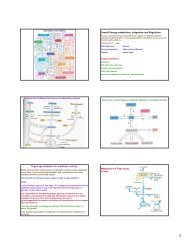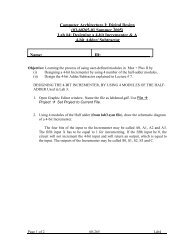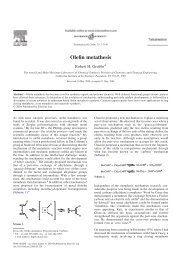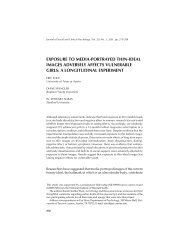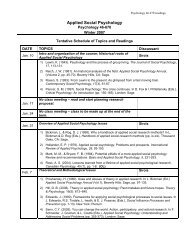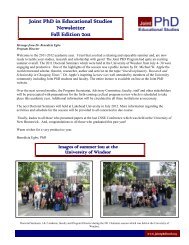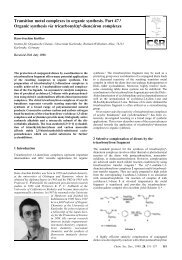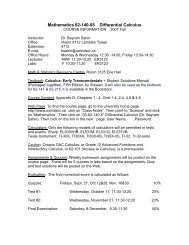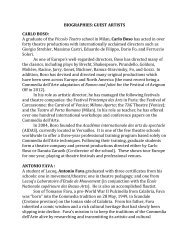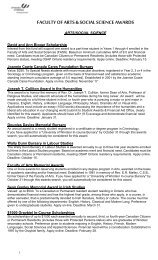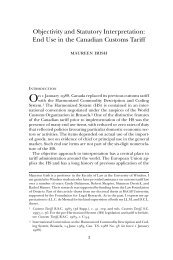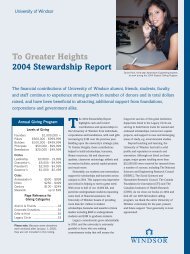Critical Social Work - University of Windsor
Critical Social Work - University of Windsor
Critical Social Work - University of Windsor
Create successful ePaper yourself
Turn your PDF publications into a flip-book with our unique Google optimized e-Paper software.
Brown<br />
Dezendorf, 2005, p.31). Counterstories can emerge outside constraining discourses when these<br />
discourses are deconstructed and disrupted.<br />
Rossiter (2005) illustrates the value <strong>of</strong> deconstructing these oppositional constructions<br />
through discourse analysis and as a way to critically reflect upon and problematize experience.<br />
Through deconstructing case histories in her social work classes, Rossiter is able to identify the<br />
“ruling” or dominant discourse in the stories and the way that discourse shapes perspectives,<br />
actions, and experience itself. Within narrative therapy, the process <strong>of</strong> externalization similarly<br />
involves deconstructive elements in the unpacking <strong>of</strong> people’s stories and the re-authoring <strong>of</strong><br />
preferred counterstories. Pozutto, Angell, & Dezendorf, (2005) suggest that narrative therapy is<br />
able to destabilize dominant discourse:<br />
Narrative therapy, because <strong>of</strong> its critical, deconstructive elements, has the possibility <strong>of</strong><br />
modifying the continued reproduction <strong>of</strong> social relations…Narrative therapy questions<br />
the fundamental concepts each individual utilizes to understand and create his or her<br />
world. Narrative therapy seeks to remove the ‘naturalness” <strong>of</strong> present social relations and<br />
reveal their possibility. In this sense, it is a critique; in the sense that it assists in creating<br />
opportunity and alternative human actions facilitating growth and development, it is<br />
therapy. … The critique is destabilizing.… To problematize the natural is not an easy<br />
task, particularly since power relations and systems <strong>of</strong> knowledge support it (p. 35).<br />
Clearly, we cannot characterize social identity as inevitable. Although we need to avoid<br />
using categories <strong>of</strong> social identity as though they were natural, ahistorical, essential or unified, it<br />
is important that we preserve a tension between accepting, valuing, and rejecting these categories<br />
as they now exist (Butler, 1992; Riley, 1988). Simply reinvoking binary gender categories sets<br />
up a limited framework for discovery and limits alternative possibilities in our work with clients.<br />
Reinscribing difference in everyday talk becomes a normalizing technique <strong>of</strong> power. Brown &<br />
Augusta-Scott (2007a, 2007b), Elliot (1998), Hare-Mustin (1994), and Rossiter (2005)<br />
emphasize the value <strong>of</strong> deconstructing dominant discourse and allowing alternative counterstories<br />
to emerge that have been previously rendered invisible within clinical work.<br />
Master’s Tools: Limitations <strong>of</strong> Modernism and Postmodernism<br />
Knowledge, Power, and Difference<br />
The modernist construction <strong>of</strong> power within anti-oppressive practice <strong>of</strong>ten reveals a<br />
binary approach to knowledge and power which presumes that people either have power or they<br />
do not (Brown, 2003, 2007b; Flaskas & Humphries, 1993; Fook, 2002; Fook & Morley, 2005;<br />
Foucault, 1980a; White & Epston, 1990). Power is constructed as intentionally imposed from<br />
above to in order to control others, and that in doing so, those with power maintain their own<br />
power and privilege, at the expense <strong>of</strong> those without power and privilege. Foucault (1980a,<br />
1980b) articulates a more textured approach to power which allows us to notice how power is<br />
filtered through everyday discourse. Normalizing or regulating techniques <strong>of</strong> power infuse daily<br />
cultural practices and as they escape substantial contention, they reinforce socially constructed<br />
reality.<br />
Rethinking power includes challenging the ways that both social workers and clients<br />
keep oppressive stories alive either through not unpacking experience and/or through the social<br />
<strong>Critical</strong> <strong>Social</strong> <strong>Work</strong>, 2012 Vol. 13, No. 1<br />
49




